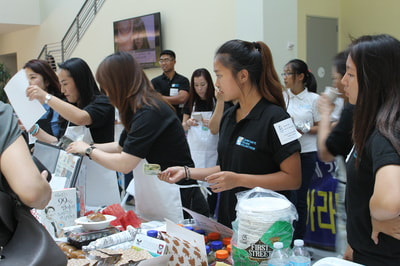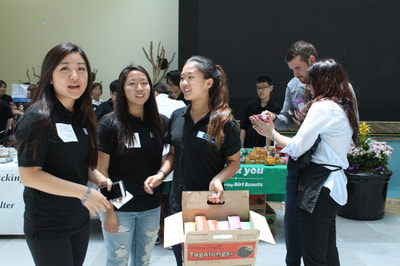STEM: SCIENCE EDUCATION RESOURCES BY CAITLIN KIM
Are you captivated by the mysteries of the universe or the intricate workings of technology? Do you find yourself eagerly anticipating your next science or math class? If so, diving deeper into the world of science and its related fields is an adventure worth considering. This journey is encapsulated in the acronym STEM, which stands for Science, Technology, Engineering, and Mathematics. STEM is more than just a collection of subjects; it's a multidisciplinary approach that weaves these core areas together, preparing students for a future where these skills are not just useful but essential.
STEM : Understanding STEM Education (Science, Technology, Engineering, and Mathematics)
STEM education is not merely about memorizing facts or formulas; it's about grasping the interconnectedness of these disciplines and applying them to solve real-world problems. This educational approach fosters critical thinking, problem-solving, and innovation. If you're intrigued by technology, enjoy your math and science classes, and are curious about how things work, STEM education could be your gateway to an exciting and fulfilling future.
Why Opt for STEM?
In a world increasingly driven by technological advancements and scientific discoveries, STEM fields are at the forefront of innovation. Pursuing STEM can lead to careers that tackle global challenges, from environmental sustainability to developing cutting-edge technological solutions. Moreover, STEM careers are growing rapidly, making them vital for economic development and societal progress.
Benefits of STEM Education
STEM education goes beyond academic knowledge. It equips students with valuable life skills, including:
The Future of STEM
The future is increasingly shaped by developments in STEM fields. From artificial intelligence and robotics to renewable energy and biotechnology, STEM professionals are leading the charge in creating a better, more sustainable world. By choosing a STEM-focused education, students are not only preparing themselves for rewarding careers but also positioning themselves to be at the forefront of shaping the future.
Global Impact and Opportunities
STEM education opens doors to global opportunities. Many STEM careers are in high demand worldwide, offering chances for international collaboration, travel, and cultural exchange. Additionally, STEM professionals often work on projects with global impact, addressing issues like climate change, healthcare, and global security.
Economic Benefits
STEM careers are among the highest-paying and most secure jobs in the modern economy. With a strong foundation in STEM, students can look forward to not only fulfilling but also financially rewarding careers. Furthermore, STEM professionals play a crucial role in driving economic growth and innovation, making them valuable assets in any economy.
Lifelong Learning and Curiosity
STEM education instills a love for lifelong learning. The ever-evolving nature of STEM fields means that there’s always something new to discover and explore. This continuous learning keeps careers dynamic and intellectually stimulating.
Conclusion
Choosing a path in STEM is more than just selecting a field of study; it's embracing a future of endless possibilities, challenges, and innovations. Whether you dream of exploring the depths of space, engineering groundbreaking technologies, or solving pressing environmental issues, a STEM education is your launchpad to a future where you can make a significant impact. So, if you're ready to embark on this exciting journey, STEM awaits with open arms and a world of opportunities.
Are you captivated by the mysteries of the universe or the intricate workings of technology? Do you find yourself eagerly anticipating your next science or math class? If so, diving deeper into the world of science and its related fields is an adventure worth considering. This journey is encapsulated in the acronym STEM, which stands for Science, Technology, Engineering, and Mathematics. STEM is more than just a collection of subjects; it's a multidisciplinary approach that weaves these core areas together, preparing students for a future where these skills are not just useful but essential.
STEM : Understanding STEM Education (Science, Technology, Engineering, and Mathematics)
STEM education is not merely about memorizing facts or formulas; it's about grasping the interconnectedness of these disciplines and applying them to solve real-world problems. This educational approach fosters critical thinking, problem-solving, and innovation. If you're intrigued by technology, enjoy your math and science classes, and are curious about how things work, STEM education could be your gateway to an exciting and fulfilling future.
Why Opt for STEM?
In a world increasingly driven by technological advancements and scientific discoveries, STEM fields are at the forefront of innovation. Pursuing STEM can lead to careers that tackle global challenges, from environmental sustainability to developing cutting-edge technological solutions. Moreover, STEM careers are growing rapidly, making them vital for economic development and societal progress.
Benefits of STEM Education
STEM education goes beyond academic knowledge. It equips students with valuable life skills, including:
- Problem-solving and Critical Thinking: STEM education teaches students to approach problems methodically, analyze data, and develop solutions based on evidence and reasoning.
- Collaboration and Teamwork: Many STEM projects require teamwork, encouraging students to work effectively with others, share ideas, and respect different perspectives.
- Risk-taking and Experimentation: STEM encourages a hands-on approach, where trial and error are part of the learning process. This fosters a mindset that is not afraid of taking calculated risks.
- Resilience and Adaptability: As students engage in complex STEM projects, they learn to adapt to new information, overcome setbacks, and persist in the face of challenges.
- Creativity and Ingenuity: STEM isn’t just about logic and precision; it also involves creative thinking and innovation. Students learn to think outside the box and develop unique solutions.
- Effective Application of Knowledge: STEM education emphasizes the practical application of knowledge, ensuring that students can use what they learn in real-world scenarios.
- Embracing and Leveraging New Technologies: In a rapidly evolving technological landscape, STEM education keeps students at the cutting edge, enabling them to understand and utilize emerging technologies.
The Future of STEM
The future is increasingly shaped by developments in STEM fields. From artificial intelligence and robotics to renewable energy and biotechnology, STEM professionals are leading the charge in creating a better, more sustainable world. By choosing a STEM-focused education, students are not only preparing themselves for rewarding careers but also positioning themselves to be at the forefront of shaping the future.
Global Impact and Opportunities
STEM education opens doors to global opportunities. Many STEM careers are in high demand worldwide, offering chances for international collaboration, travel, and cultural exchange. Additionally, STEM professionals often work on projects with global impact, addressing issues like climate change, healthcare, and global security.
Economic Benefits
STEM careers are among the highest-paying and most secure jobs in the modern economy. With a strong foundation in STEM, students can look forward to not only fulfilling but also financially rewarding careers. Furthermore, STEM professionals play a crucial role in driving economic growth and innovation, making them valuable assets in any economy.
Lifelong Learning and Curiosity
STEM education instills a love for lifelong learning. The ever-evolving nature of STEM fields means that there’s always something new to discover and explore. This continuous learning keeps careers dynamic and intellectually stimulating.
Conclusion
Choosing a path in STEM is more than just selecting a field of study; it's embracing a future of endless possibilities, challenges, and innovations. Whether you dream of exploring the depths of space, engineering groundbreaking technologies, or solving pressing environmental issues, a STEM education is your launchpad to a future where you can make a significant impact. So, if you're ready to embark on this exciting journey, STEM awaits with open arms and a world of opportunities.
Your Resource for All Things Science
Help resources - these are resources that will help you in any class you are currently in or are going to take
- https://www.youtube.com/c/crashcourse
- Crash course is a youtube channel that creates 100% free content on a wide variety of topics, many of which are science-related, others are not, but they will most likely have the science topic you are looking for.
- https://www.stempotential.com/more-about-discord
- This is a link to join a discord called STEM Potential. It is a server that is connected to many STEM teachers and college professors all there to provide resources and answer your questions. To start, hit the “join the discord” button and, when joined, view the pinned messages (top right corner) to get started, you will have to take a short survey explaining the rules and instructions for the server.
- https://www.khanacademy.org/
- Kahn Academy is a great resource for free lessons/tutoring on school science topics. They also have lessons for math, english, history, and some AP classes.
- https://www.youtube.com/watch?v=cre5jHBe6Lc
- This is a video on how to do well in a Chemistry class. While it may not be instant help on a homework assignment or lab report, it tells you how to approach the class, how to study, and what to look out for to maximize your effort.
- https://www.youtube.com/watch?v=lMxq2_p6-B4
- This is a video on how to do well in a Biology class. While it may not be instant help on a homework assignment or lab report, it tells you how to approach the class, how to study, and what to look out for to maximize your effort.
- https://www.youtube.com/c/TheOrganicChemistryTutor
- The Organic Chemistry Tutor is a channel that creates reviews concepts for chemistry, some physics, and many math classes. This is useful if there is a specific concept you do not understand or if you need to review for an exam.
- https://www.youtube.com/c/AmoebaSisters
- The Amoeba Sisters is a channel that deals with all tings Biology, especially for high school biology students. While te videos themselves may seem cartoonish, they explain big concepts in easy-to-understand ways.
- https://www.youtube.com/watch?v=TTHazQeM8v8
- This is a sort video (17 min) on everything you need to know about physics. Whether you are studying for an exam, want to brush up and you come back from a break, or want a quick preview for the year to come, this video will prove useful.
- https://www.youtube.com/playlist?list=PLg-DoAEop0Uu_Z9gi5HOCTcFxQLyKtL2v
- This is a playlist of videos that review/explain concepts for high school physics. It is good for exams, homework, or general review, the channel itself, Schooling Online, teaches on other subjects, mainly english and literary analysis, that could also be of use.
- https://usa1lib.org/book/656101/c0a29c?dsource=recommend
- This is a page on Z Library. They have not only almost every “___ for Dummies” book, but most textbook and novels that you can download for free.
Learning IRL - these are places that you can go to learn or to discover a new interest
- https://www.robotevents.com/map
- This is a place where you can find VEX Robotics Competitions near you. They are free to attend and are all around LA so you can find one near you. VEX IQ is for Elementary Schoolers, VEX Robotics Competition is for Middle and High Schoolers, and VEX U is for College Students. You can attend any that you want. If you find interested in VEX, you can contact the event managers and ask if you can volunteer at the event, many competitions are always looking for extra help. The VEX Competitions run from about September to April, so they may not be available year-round.
- https://www.jpl.nasa.gov/
- This is the official website for NASA’s Jet Propulsion Laboratory (JPL). For anyone into aerospace engineering, they give both physical and virtual tours, just click the “visit” dropdown on the website’s heading. Just note, to take a physical tour, you will need to provide either a passport if you are under 18 or a gov. issued ID if you are 18 or older.
- https://californiasciencecenter.org/
- The California Science Center often has a rep for being a “kids’ thing”, but they have some cool things meant for everyone. Admission is free (with some exceptions), so that’s a plus. I would make a reservation though, because they have timed admissions, so it could get complicated.
- https://griffithobservatory.org/
- The Griffith Observatory is a place for those into astronomy or looking to learn new things about what is in our sky. They are open Friday - Sunday and there is a bus that takes you right up to the observatory which runs every day.
Learn new things - these are some resources that you can use to maybe discover a new interest.
- https://www.youtube.com/c/SciShow
- This is SciShow, a youtube channel that makes videos about random science topics so that you can learn new things schools would not normally teach you. The channel is produced by the same person that produces Crash Course.
- https://www.codecademy.com/
- This website teaches you all the basic programming languages for free (there is a paid add-on, but it’s unnecessary). All you have to do is create an account and you are all set.
- https://medium.com/
- This is Medium, a place where people can write about any topic they’d like. When making an account, you can select any topics that interest you, science or not, and the website will present you with an array of articles regarding those subjects.
- https://medium.com/predict - Predict is a Medium publication that has articles about a number of cool emerging technologies.
- https://medium.com/@caitlinkim - this is my own account, I have some articles on there providing basic guides to some emerging technologies such as Brain-Computer Interfaces and 3D-Printing
- One of the great things about Medium s that it allows anyone to write articles, so if you learn about something, and find it interesting, write about it. Teaching others has been proven to be one of the best ways to strengthen your knowledge on a topic.
- https://www.youtube.com/c/Brackeys
- Brackeys is a channel that works with all things games. How to make them, 3D games, 2D games, even coding basics.
- https://www.youtube.com/watch?v=DAOFpgocfrg
- This is a video that explains what nanotechnology is. This is a point from which you can start a rabbit hole on the subject.
Content Courtesy : We Are Teachers
Best Science Websites for Middle and High School"
by Jeanne Croteau, published on April 5, 2021, the author provides a comprehensive list of science websites categorized by different fields of study suitable for middle and high school students. The article recognizes that science can be exciting but sometimes challenging, and it aims to help students and educators find valuable online resources to make learning more engaging.
The article is divided into sections based on various science subjects, including Biology, Chemistry, Earth Science, Environmental Science, and Physics. Here is a summary of the key sections and the highlighted websites within each category:
Biology:
- HHMI Biointeractive: Offers free movies, posters, 3-D interactives, virtual labs, and printable activities.
- Biology Junction: Provides templates for lab reports, club ideas, pacing guides, and lessons for various biology courses.
- Biology Corner: Developed by a high school teacher, this site offers curated resources from the web along with extra practice, presentations, and ready-to-use investigations.
- Virtual Urchin: Utilizes sea urchins to engage students in life science concepts, from basic biology to university-level curriculum.
- NOVA Labs: Offers an evolution lab to teach phylogeny, evolutionary history, DNA's role in evolution, and more.
- Ward’s Science featuring Ward’s World: Provides free classroom activities, how-to videos, and resources for chemistry, biology, physics, and earth science.
- ChemCollective: Stands out with scenario-based activities and forensics tie-ins, making chemistry engaging.
- Bozeman Science: Offers clear, standards-aligned videos, particularly useful for teaching AP Chemistry.
- American Association of Chemistry Teachers: Provides high-quality resources, including labs, demonstrations, and activities, organized by grade and topic.
- Middle School Chemistry: Suitable for grades 9-10, this site offers lesson plans that are easy to find and some available in Spanish.
- Annenberg Learner Interactives: Offers interactive resources, including the Periodic Table Interactive and Chemistry: Challenges and Solutions.
- Annenberg Learner Interactives: Provides resources such as the Dynamic Earth Interactive, which explores Earth's layers and plate tectonics.
- National Oceanic and Atmospheric Administration Resource Collections: Contains lesson plans with NOAA data and real-time weather information.
- GeoInquiries: Covers map-based concepts found in earth science courses, including topography, earthquakes, volcanoes, oceans, weather, and climate.
- Inq-ITS: Offers digital labs focusing on earth science topics for middle and high school students.
- High-Adventure Science: Features free online curriculum lessons for classroom instruction, including Earth systems models and assessments.
- National Geographic Education: Offers lessons on topics like The Water Cycle, Erosion, Precipitation, and Metamorphic Rocks.
- Global Footprint Network Ecological Footprint Calculator: Allows students to calculate ecological footprints and analyze lifestyle changes' impact.
- Population Education: Provides interactive maps, lesson finders, and materials available in Spanish.
- National Energy Education Development Project: Offers energy usage data, information on energy technological advances, and downloadable Energy Infobooks.
- Annenberg Learner Interactives: Features video courses like The Habitable Planet and Earth Revealed.
- GeoInquiries: Supports map-based concepts found in high school environmental science courses.
- PhET Interactive Simulations: Provides teacher-submitted and reviewed lessons to help students explore physics topics.
- The Physics Classroom: Offers a wide range of resources, including a curriculum corner, question bank, lab area, and NGSS-devoted page.
- Share My Lesson: Contains handouts, labs, and lectures submitted by physics teachers on various topics.
- Flipping Physics: Provides clear content, algebra, and calculus reviews, making physics more understandable.
- Physics for the 21st Century: Offers learning units, videos, interactive simulations, and a comprehensive Facilitator's Guide.
- New Jersey Center for Teaching and Learning: Provides a wealth of resources for physics, math, and chemistry online.
- Annenberg Learner Interactives: Features interactive exhibits like Amusement Park Physics, allowing students to explore physics laws through roller coaster design.
Science Competition and Award Programs for High School
Participating in science competitions offers numerous benefits for high school teens, both academically and personally. Here are several reasons why going to science competitions can be highly beneficial:
- Skill Development: Science competitions challenge students to think critically, solve complex problems, and apply their knowledge and skills in real-world scenarios. This enhances their analytical and problem-solving abilities.
- Deeper Understanding: Competing in science allows students to delve deeper into scientific concepts and gain a more profound understanding of the subject matter, often beyond what's covered in standard classroom curricula.
- Research Experience: Many competitions involve conducting original research or projects. This provides students with valuable research experience, including designing experiments, collecting data, and drawing conclusions – skills that are highly relevant for future academic and professional pursuits.
- Presentation Skills: Science competitions often require participants to present their findings or solutions to judges or peers. This helps students develop effective communication and presentation skills, which are valuable in both academic and professional settings.
- Networking: Science competitions bring together like-minded students and experts in various fields. Teens have the opportunity to network, collaborate, and build relationships with peers and mentors who share their passion for science.
- Motivation and Passion: Competing in science can ignite or reinforce a passion for STEM (Science, Technology, Engineering, and Mathematics) fields. It can inspire students to pursue STEM-related careers or further education.
- Recognition and Awards: Winning or even participating in prestigious science competitions can earn students recognition and awards, which can bolster college applications and scholarship opportunities.
- College Admissions: Many colleges and universities value participation in science competitions as it demonstrates a student's commitment to academics, dedication, and a strong work ethic. It can be a differentiating factor in college admissions.
- Problem Solving: Science competitions often present students with real-world problems that require innovative solutions. This fosters creativity and the ability to approach challenges with novel ideas.
- Self-Confidence: Successfully competing in science competitions can boost a student's self-confidence and self-esteem. It validates their abilities and encourages them to take on more significant challenges.
- Exposure to Diversity: Many science competitions are international or national in scope, providing students with exposure to diverse perspectives, cultures, and ways of thinking.
- Passion Projects: These competitions allow students to explore topics they are passionate about, which can be more motivating and engaging than traditional coursework.
Science Competition and Award Programs for High School Students
DAVIDSON FELLOWS
Hosting Institution: Davidson Institute
Format: In-person (Reno, NV)
Application Deadline: February 15, 2023
Description: Scholarships ranging from $10,000 to $50,000 USD awarded to students presenting innovative solutions in STEM, Literature, Music, and Philosophy.
NATIONAL SCIENCE BOWL
Hosting Institution: U.S. Department of Energy
Format: In-person
Description: High school teams compete in various science disciplines, including biology, chemistry, physics, energy, and math.
ODYSSEY OF THE MIND
Hosting Institution: Odyssey of the Mind
Format: In-person
Description: Teams of students work on long-term problems with creative solutions, emphasizing innovation and presentation.
REGENERON INTERNATIONAL SCIENCE AND ENGINEERING FAIR (ISEF)
Hosting Institution: Society for Science
Format: In-person
Description: Students compete for awards totaling nearly $8 million, with a top prize of $75,000 USD.
REGENERON SCIENCE TALENT SEARCH (STS)
Hosting Institution: Society for Science
Format: In-person
Description: High school seniors with independent research projects can win up to $250,000 USD.
MIT THINK SCHOLARS PROGRAM
Hosting Institution: MIT
Format: In-person
Description: Students with extensive research backgrounds receive $1,000 funding and an all-expenses-paid trip to MIT.
EXPLORAVISION
Hosting Institution: Toshiba/NSTA
Format: Online
Description: Students explore future technology, envisioning its evolution ten years ahead.
ENVIROTHON
Hosting Institution: National Conservation Foundation
Format: In-person
Description: Teams of five students focus on environmental and natural resource conservation problem-solving.
STOCKHOLM JUNIOR WATER PRIZE
Hosting Institution: Water Environment Federation
Format: In-person
Description: Students present water-related science projects, with the winner advancing to Regeneron ISEF.
JUNIOR SCIENCE AND HUMANITIES SYMPOSIUM
Hosting Institution: JSHS
Format: In-person
Description: High school students present original scientific research papers and engage with STEM professionals.
DESTINATION IMAGINATION CHALLENGE EXPERIENCE
Hosting Institution: Destination Imagination
Format: In-person
Description: Teams tackle creative challenges, fostering critical thinking and teamwork.
AERIAL DRONE COMPETITION
Hosting Institution: Various
Format: In-person
Description: Students pilot drones to score goals and land them on designated pads.
NATIONAL SCIENCE OLYMPIAD
Hosting Institution: National Science Olympiad
Format: In-person
Description: Teams participate in science challenges at 400 tournaments nationwide.
AMERICAN COMPUTER SCIENCE LEAGUE (ACSL)
Hosting Institution: ACSL
Format: Online
Description: Contests cover computer science topics, including programming problems.
AMERICAN INVITATIONAL MATHEMATICS EXAM (AIME)
Hosting Institution: AMC
Format: In-person
Description: AIME is a 15-question, 3-hour exam for top-scoring participants to qualify for USAMO.
CANADIAN COMPUTING COMPETITION (CCC)
Hosting Institution: University of Waterloo
Format: Online
Description: Students solve questions online, with commendation in CCC official results.
ARCGIS ONLINE COMPETITION
Hosting Institution: Esri
Format: Online
Description: Students conduct research and create StoryMaps about topics relevant to their home state.
FPSPI CREATING THE FUTURE SCHOLARSHIP
Hosting Institution: Future Problem Solving Program
Format: Online
Description: Graduating high school students with FPSPI experience are recognized.
INTERNATIONAL BIOLOGY OLYMPIAD (IBO)
Hosting Institution: IBO
Format: In-person
Description: High school biology competition with theoretical and practical exams.
NATIONAL ROBOTICS CHALLENGE
Hosting Institution: National Robotics Challenge
Format: In-person
Description: Students are tested in areas of manufacturing, technology, robotics, and automation.
SOLAR CAR CHALLENGE
Hosting Institution: Solar Car Challenge Foundation
Format: In-person
Description: Teams design and race solar-powered cars.
THE TECH CHALLENGE
Hosting Institution: The Tech Interactive
Format: In-person
Description: Teams use engineering to solve real-world problems, culminating in a showcase.
NORTH AMERICAN COMPUTATIONAL LINGUISTICS OPEN COMPETITION (NACLO)
Hosting Institution: NACLO
Format: In-person
Description: Students solve linguistic problems and explore language diversity and technologies.
VIRGINIA TECH HIGH SCHOOL PROGRAMMING CONTEST
Hosting Institution: Virginia Tech
Format: Online
Description: Online coding competition for high school students in various programming languages.
GENES IN SPACE
Hosting Institution: Boeing, miniPCR bio, ISS U.S. National Laboratory, New England Biolabs
Format: In-person (Washington, DC)
Application Deadline: April 15, 2023 (for the 2024 competition)
Description: Students design DNA experiments addressing space exploration challenges, with the grand prize being an opportunity to participate in Space Biology Camp and witness the launch of their experiment to space.
U.S. STOCKHOLM JUNIOR WATER PRIZE
Hosting Institution: The Water Environment Federation
Format: In-person (location varies by year)
Application Deadline: April 15, 2023 (for the state competition)
Description: Students present water-related science projects, advancing from state to national and international levels, and welcoming students from various educational backgrounds.
ENVIROTHON
Hosting Institution: National Conservation Foundation
Free science resources for educators and parents
Schools around the world have closed to prevent the spread of COVID-19, leaving parents and teachers scrambling to figure out how kids can learn at home. We can help! Science News Explores and the Science News in High Schools Digital Library offer a variety of free, age-appropriate STEM resources for kids from fifth through 12th grades.
Science News Explores Stay up to date on the latest news and science discoveries with articles written in a kid-friendly way. Science News Explores offers helpful resources for at-home learning, including:
- Experiments. Learn science by doing science! Using real scientific research projects as a guide, Science News Explores shows kids how to apply the scientific method to make their own experiments at home.
- Explainers. Ever wonder how scientists read brain activity, or how the greenhouse effect works? Use this series of articles to explore core science concepts behind the news, including the new coronavirus.
- Discussion Questions. Some articles come with questions that students can answer before, during and after reading to enhance comprehension.
- Let’s learn about. This new series mixes STEM learning and fun. Stories are paired with relevant educational resources, a new word find puzzle and fun content such as videos from elsewhere on the Web.
Science News in High SchoolsThe Science News in High Schools Digital Library has dozens upon dozens of original STEM-related exercises, all tied to Science News articles. Whether you’re looking for material about evolution, space, chemistry, climate change, public health or anything in between — we’ve got you covered. Use these resources to engage students with core high school concepts or to build virtual lessons for your students.
- Comprehension questions and Discussion prompts. Ask students to read an article and answer the related questions to check their comprehension, or engage them in a conversation that makes connections to current events and across fields of science.
- Activities. Experiments, along with exercises on data analysis, diagramming and designing research projects, put students at the center of their learning. Use these activities at home or to increase virtual collaboration among students.
- Paired articles. Most exercises connect to a Science News article and a Science News Explores version, written at a lower reading level, to best meet each child’s needs.
- Student worksheets and answer keys. Downloadable worksheets are easy to print out, and answer keys make it simple to check the work.
The Science News in High Schools program serves nearly 5,000 public high schools across the United States and worldwide. If you’re interested in receiving free Science News magazines plus educator resources next school year, sign up here.
We hope these resources help you through these challenging times. Have a question or a suggestion about these resources? E-mail [email protected].












